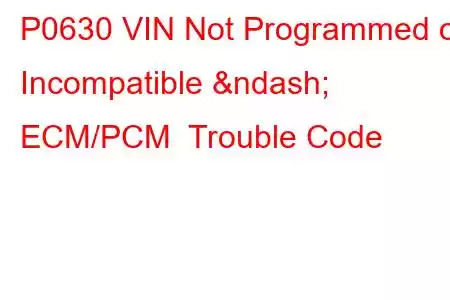P0630 VIN Not Programmed or Incompatible – ECM/PCM
OBD-II Trouble Code Technical Description
VIN Not Programmed or Incompatible – ECM/PCM
What does that mean?
This is a generic diagnostic trouble code (DTC) and applies to many OBD-II vehicles (1996-newer). That may include but is not limited to vehicles from Ford, Hyundai, Toyota, Lotus, Dodge, Ram, Honda, Cummins, etc. Although generic, the exact repair steps may vary depending on year, make, model and powertrain configuration.
When a code P0630 is stored, it means that the engine control module (ECM) or powertrain control module (PCM) does not recognize the 17-character vehicle identification number (VIN).
Every vehicle produced in North America is assigned a VIN. This series of numbers and letters denotes the country of manufacture, year, make, and model of the vehicle, as well as any special equipment and the engine size/type. The last six-digits at the end of the VIN provide the sequence in which each vehicle was produced. No two vehicles are assigned exactly the same number.
Since the inception of OBD-II diagnostic systems, the VIN has been programmed into each ECM/PCM (after it is installed in the vehicle). Other controllers may also be programmed to recognize the VIN but a federal mandate demands that the ECM/PCM is programmed as such.
The primary reason for government and auto industry insistence that the ECM/PCM be programmed to recognize the VIN is to discourage vehicle and controller theft and prevent odometer tampering. System controllers cannot be swapped between vehicles without being programmed to match the vehicle. Vehicle mileage is also programmed into the ECM/PCM. If controllers could be swapped between vehicles, odometer readings would be far less accurate if not totally unreliable. When an ECM/PCM Is replaced, it must be programmed with the vehicle’s odometer reading and VIN (among other things).
If the ECM/PCM fails to find or recognize the VIN, a code P0630 will be stored and a malfunction indicator lamp (MIL) may be illuminated. The ECM/PCM searches for the VIN when the key is turned on and the self-test is ran. In most cases, the ECM/PCM will not function without VIN recognition.
Photo of a PCM with the cover removed:
What is the severity of this DTC?
Since the ECM/PCM is not likely to function without VIN recognition, a stored code P0630 should be categorized as severe.
What are some of the symptoms of the code?
Symptoms of a P0630 trouble code may include:
No start condition Vehicle security system may be activated Other diagnostic codes will likely be storedWhat are some of the common causes of the code?
Causes for this code may include:
ECM/PCM programming error ECM/PCM swapped between vehicles or replaced without being properly programmed ECM/PCM failureWhat are some P0630 troubleshooting steps?
Unlike most other stored codes, the P0630 is usually related to ECM/PCM failure or some type of programming error. Due to the delicate nature of certain parameters which must be programmed into the ECM/PCM (VIN and mileage), access to reprograming equipment must be limited to qualified personnel. Without the means to reprogram the controller in question, making a successful repair will be very unlikely.
You will need a diagnostic scanner and a reliable source of vehicle information to arrive at a reasonable diagnosis of a code P0630. Use the vehicle information source to search for applicable technical service bulletins (TSB). If you locate a TSB that matches the vehicle make and model, symptoms exhibited, and the code stored, it will help to point you in the right direction.
I would connect the diagnostic scanner to the vehicle diagnostic port and read the VIN as it is perceived by the ECM/PCM. Compare the VIN on the diagnostic scanner to the actual VIN (lower driver s
Read: 39


